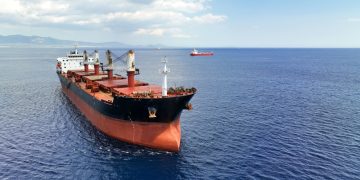In its quarterly publication, the NGO Shipbreaking Platform informed about the current conditions in Gadani shipbreaking industry after the dramatic explosion of 1 November 2016, the worst tragedy in the history of shipbreaking.
Firstly, the Pakistani shipbreaking industry is the third larges t in the world, after India and Bangladesh. It is located around 60 km South-west of Karachi and cover s the 10km coast of Gadani. Prior to Pakistan’s independence in 1947, informal shipbreaking operations were carried out in Gadani and then expanded to Indi a and Bangladesh. As a result of low labour costs, almost no occupational health and safety regulations, as well as low enforcement of environmental rules, this sector developed rapidly.
In 1978, realising the potential importance of the shipbreaking to the national economy, the Government of Pakistan announced several measures, including the classification of Gadani a s a port, the reduction of import taxes on end-of-life ships, and the establishment of a unit to address infrastructure and logistics matters. The Government of Balochistan under the Balochistan Development Authority (BDA) Ac t of 1974 created the “The Balochistan Ship Breaking Industry Rules , 1979” to regularise the shipbreaking sector as an industry.
According to the NGO Shipbreaking Platform, the Gadani shipbreaking industry received huge attention after the dramatic explosion of 1 November 2016, the worst tragedy in the history of shipbreaking. At least 29 workers were then killed and more than 60 workers were reported injured, many of them suffering severe burn wounds.
Gradually, the industry started to decline a s a result of some government policies such a s high taxation rates, increasing accidents which resulted in high number of deaths and injuries, as well as competition from the other South Asian destinations. In 2019, Gadani shipbreaking industry was generating less than one fifth of the scrap it used to generate in the 1980s. Recently, the sector is collapsing due to different socio-economic factors, with only two or three yards operating.
Current conditions in Gadani
The harsh working conditions in Gadani became widely known after the explosion on 1 November 2016. Yet, workers’ safety and environmental protection are still largely ignored. Every plot now has a water filter installed and a washroom, but there is still a lack of basic infrastructures and services such as access to adequate medical assistance in case of accidents, sewage systems, schools and proper housing. Most workers make their own housing arrangements in the area surrounding the yards. They live in shanties along and around the road behind the yards which are made out of materials from the ships.
As informed, the majority of the workforce are migrant workers who come from Khyber Pakhtunkhwa, Punjab and Sindh. Many Rohingya, Bengalis and Burmese have also become part of the labour force in Gadani. Although they work for years, workers usually do not work longer than the minimum 4-months period in the same yard. There is only work where there is a ship waiting to be dismantled. The shipbreaking workers earn around 30.000 Pakistani rupees/month, which is more than the very low Pakistani minimum wage of 25.000 rupees/month. Most of the laborers are not directly employed by the shipbreaking company but they work through contractors (Jamadaar).
In this way, the owners avoid liability. In Pakistan, when a worker works less than four months, the employer is not considered liable. Also, workers are not covered by social security, hence they are not entitled for registration. If a worker dies performing his job at the yard, his family can only hope that the labour union will pay out the mere 200,000 rupees (about 2000 USD) that is often only verbally promised. If they are injured, workers have no local hospital to go to. The nearest hospital is located in Karachi, yet injured workers have no access to ambulances.
At the moment, very few workers are in Gadani. Most of them returned to their home villages since there is no work at the yards. Some currently have some occasional job by collecting “iron dust”. They filter the metallic parts from the sand of the beaches. They have to dig out around 4 to 5 meters of sand to find different valuable pieces. They receive 50% from the selling of these pieces and the other 50% goes to the yard owner. If they collect 1 ton of these pieces, they receive half of 180.000 Pakistani rupees. “Sometimes this can even be done in one day”, they say.
































































